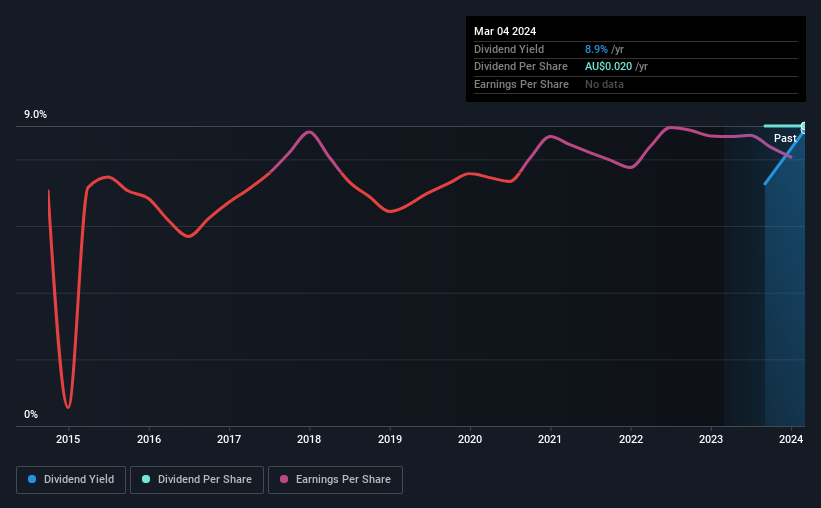Be Sure To Check Out Finexia Financial Group Limited (ASX:FNX) Before It Goes Ex-Dividend
Finexia Financial Group Limited (ASX:FNX) stock is about to trade ex-dividend in 3 days. The ex-dividend date occurs one day before the record date which is the day on which shareholders need to be on the company's books in order to receive a dividend. The ex-dividend date is important as the process of settlement involves two full business days. So if you miss that date, you would not show up on the company's books on the record date. Thus, you can purchase Finexia Financial Group's shares before the 8th of March in order to receive the dividend, which the company will pay on the 28th of March.
The company's upcoming dividend is AU$0.005 a share, following on from the last 12 months, when the company distributed a total of AU$0.02 per share to shareholders. Based on the last year's worth of payments, Finexia Financial Group stock has a trailing yield of around 8.9% on the current share price of AU$0.225. Dividends are a major contributor to investment returns for long term holders, but only if the dividend continues to be paid. As a result, readers should always check whether Finexia Financial Group has been able to grow its dividends, or if the dividend might be cut.
View our latest analysis for Finexia Financial Group
Dividends are usually paid out of company profits, so if a company pays out more than it earned then its dividend is usually at greater risk of being cut. Finexia Financial Group paid out more than half (62%) of its earnings last year, which is a regular payout ratio for most companies.
Companies that pay out less in dividends than they earn in profits generally have more sustainable dividends. The lower the payout ratio, the more wiggle room the business has before it could be forced to cut the dividend.
Click here to see how much of its profit Finexia Financial Group paid out over the last 12 months.
Have Earnings And Dividends Been Growing?
Companies with consistently growing earnings per share generally make the best dividend stocks, as they usually find it easier to grow dividends per share. If business enters a downturn and the dividend is cut, the company could see its value fall precipitously. It's encouraging to see Finexia Financial Group has grown its earnings rapidly, up 52% a year for the past five years.
Finexia Financial Group also issued more than 5% of its market cap in new stock during the past year, which we feel is likely to hurt its dividend prospects in the long run. Trying to grow the dividend while issuing large amounts of new shares reminds us of the ancient Greek tale of Sisyphus - perpetually pushing a boulder uphill.
Given that Finexia Financial Group has only been paying a dividend for a year, there's not much of a past history to draw insight from.
The Bottom Line
Should investors buy Finexia Financial Group for the upcoming dividend? Finexia Financial Group has an acceptable payout ratio and its earnings per share have been improving at a decent rate. Finexia Financial Group ticks a lot of boxes for us from a dividend perspective, and we think these characteristics should mark the company as deserving of further attention.
While it's tempting to invest in Finexia Financial Group for the dividends alone, you should always be mindful of the risks involved. Every company has risks, and we've spotted 6 warning signs for Finexia Financial Group (of which 2 are concerning!) you should know about.
If you're in the market for strong dividend payers, we recommend checking our selection of top dividend stocks.
Have feedback on this article? Concerned about the content? Get in touch with us directly. Alternatively, email editorial-team (at) simplywallst.com.
This article by Simply Wall St is general in nature. We provide commentary based on historical data and analyst forecasts only using an unbiased methodology and our articles are not intended to be financial advice. It does not constitute a recommendation to buy or sell any stock, and does not take account of your objectives, or your financial situation. We aim to bring you long-term focused analysis driven by fundamental data. Note that our analysis may not factor in the latest price-sensitive company announcements or qualitative material. Simply Wall St has no position in any stocks mentioned.

 Yahoo Finance
Yahoo Finance 
